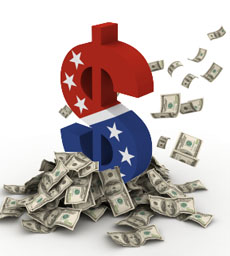Wall Street rescue raft hits rough waters in Congress
 Washington - To Republican Senator Jim Bunning, it's "financial socialism" and "un-American."
Washington - To Republican Senator Jim Bunning, it's "financial socialism" and "un-American."
To US Treasury Secretary Henry Paulson, it's the only way to rescue the country from certain economic collapse.
The White House's 700-billion-dollar rescue raft for Wall Street must navigate some challenging rapids in Congress as the proposal gets its first public airing this week.
The battle lines of anger, political posturing and resignation were already drawn by Tuesday, when Paulson and central bank head Ben Bernanke went with hat in hand to the Senate banking committee to present their three-page proposal.
The administration of US President George W Bush is demanding approval by Friday of the barebones plan it says is urgently needed to unfreeze credit blockages and keep the economy going.
It insists there can be no add-ons, such as limits on the pay of executives or partial government ownership of the companies that benefit, although it has conceded to some sort of congressional- imposed oversight.
A skeptical opposition-controlled Congress, mindful of how the body was stampeded into approving Bush's plans to invade Iraq, is saying, let's stop before riding over the falls. And even Republicans are refusing to throw support to their own president's plan.
Later Wednesday, Paulson and Bernanke were to present their plan to the House of Representatives' financial services committee, where they likely face hours more of rough waters after five hours in the Senate on Tuesday.
The historic proposed rescue plan, the latest in a series of desperate government moves this year to avert disaster in the financial industry, would help healthy finance firms and banks in addition to propping up weak or troubled companies, Paulson and Bernanke said.
The broad-based plan would purchase bad mortgage debts and complex mortgage-related-securities-gone-sour from mostly successful banks and investment houses. The idea would be to keep the companies one step ahead of the bankruptcy monster eating its way through the pillars of the US finance system.
The plan would be the largest government intervention in capital markets since the Great Depression of the 1930s, and has provoked public anger that tax dollars would be used to clean up years of unregulated Wall Street greed.
Senate banking committee chairman Chris Dodd, a member of the majority Democratic Party, questioned the wisdom of throwing 700 billion dollars into the market without any quid pro quo from the firms.
"After reading this proposal, I can only conclude that it is not just our economy that is at risk, but our Constitution as well," Dodd said Tuesday.
Noting that foreclosures were forcing 9,800 families out of their homes every day, Dodd called the crisis "an extraordinary and perilous moment in our nation's history."
Senator Richard Shelby, the senior Republican on the panel and an outspoken critic of the proposal, vowed he would not "sign off on something of this magnitude" until he knew that alternatives had been exhausted.
"The Treasury's plan ... is aimed at rescuing the same financial institutions that created this crisis with the sloppy underwriting and reckless disregard for the risk they were creating, taking or passing on to others," Shelby said Tuesday.
Stock markets have continued to plummet over the spectre of Congressional challenges to the White House plan. Investors and businesses are anxious as liquidity has dried up and credit has even disappeared to meet payrolls.
A New York Times columnist on Wednesday called for Congress to stop its posturing and demands for add-ons, and get down to business.
"Their best shot at success depends on keeping the debate tightly focused on the questions that matter most," wrote David Leonhardt. "There are really only two: What steps are most likely to solve the immediate crisis? And how can the long-term cost to taxpayers be minimized?"
Senators Barack Obama and John McCain, the Democratic and Republican presidential candidates who will also likely vote on any final measure, have cautiously weighed in.
"This is not the time for fear, not the time for panic, it's the time for resolve and responsibility and reasonableness," Obama said in broadcast remarks.
McCain, tapping into the populist cries that Wall Street high fliers should pay the price for their risky behaviour, called for "transparency" and accountability by the chief executives of firms who benefit from such a programme. (dpa)